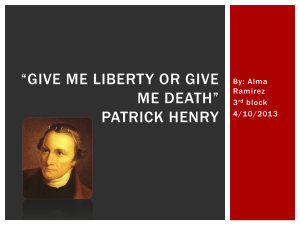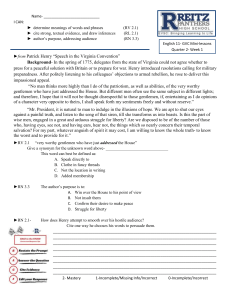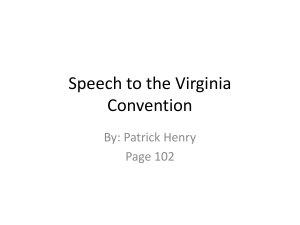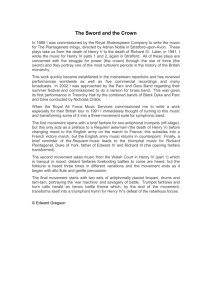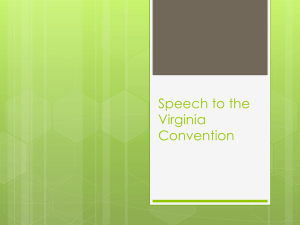Patrick Henry Close Reding Packet mine
advertisement
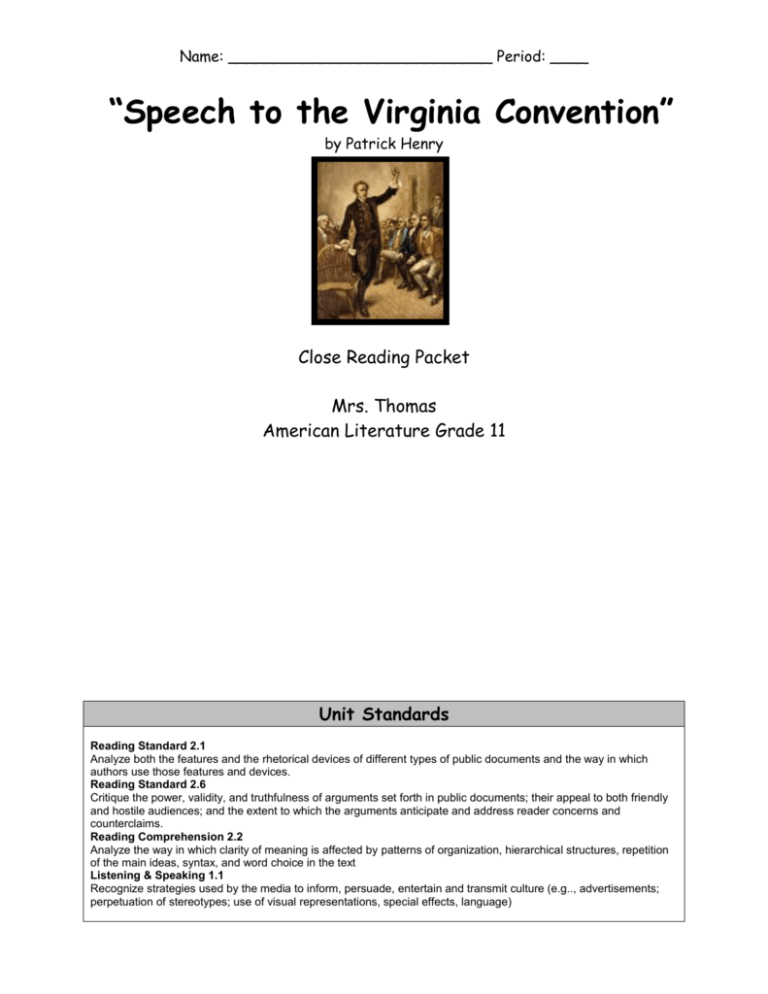
Name: ____________________________ Period: ____ “Speech to the Virginia Convention” by Patrick Henry Close Reading Packet Mrs. Thomas American Literature Grade 11 Unit Standards Reading Standard 2.1 Analyze both the features and the rhetorical devices of different types of public documents and the way in which authors use those features and devices. Reading Standard 2.6 Critique the power, validity, and truthfulness of arguments set forth in public documents; their appeal to both friendly and hostile audiences; and the extent to which the arguments anticipate and address reader concerns and counterclaims. Reading Comprehension 2.2 Analyze the way in which clarity of meaning is affected by patterns of organization, hierarchical structures, repetition of the main ideas, syntax, and word choice in the text Listening & Speaking 1.1 Recognize strategies used by the media to inform, persuade, entertain and transmit culture (e.g.., advertisements; perpetuation of stereotypes; use of visual representations, special effects, language) Page 2 Speech to the Virginia Convention by Patrick Henry REVIEW SKILLS LITERARY FOCUS: PERSUASION Persuasion is a form of writing or speech that aims to change the way a person thinks or feels. Some forms of persuasion also contain a call to action—they call on people to take action to solve a problem. To be persuasive, a writer or speaker must provide good reasons that support an opinion or course of action. Persuasive speakers can appeal to the audience’s emotions or to their logic, or reason. Listed below are two examples. Refresh your ability to evaluate as you read “Speech to the Virginia Convention.” EVALUATION Judgment of the worth or quality of a text or speech. Emotional Appeal: How could you leave your homeland, the country of your ancestors? Appeal to Reason: If you leave the country, you will have to give up your citizenship. READING SKILLS: RECOGNIZING METHODS OF PERSUASION In this speech to the Virginia Convention, Patrick Henry uses persuasive techniques. He appeals to his audience’s reason by presenting logical arguments in support of war. He also appeals to their emotions to win their support for his political position. Notice that this speech also contains another persuasive technique: a call to action. Patrick Henry Arguing the Parson’s Cause (c. 1830), attributed to George Cooke. Oil on canvas. Virginia Historical Society, Richmond, Virginia. Page 3 Vocabulary in Context DIRECTIONS: look up the actual definition of the word and record it in the column. Word Dictionary Definition solace insidious martial supplication spurned inviolate adversary vigilant inevitable Other Important Vocabulary: 1. Mr. President: Peyton Randolph (1721–1775), president of the Virginia Convention. 2. entertaining v.: having in mind; considering. 3. awful moment: great importance. 4. listen . . . beasts: In Greek mythology, the sirens are sea maidens whose seductive singing lures men to wreck their boats on coastal rocks. In the Odyssey, Circe, an enchanter, transforms Odysseus’s men into swine after they arrive at her island home. Henry’s allusion combines these two stories. 5. our petition: The First Continental Congress had recently protested against new tax laws. King George III had withdrawn the laws conditionally, but the colonists were unwilling to accept his conditions. 6. comports v.: agrees. 7. subjugation n.: conquest; domination. 8. remonstrated v.: objected; complained. 9. interposition n.: intervention; stepping in to try to solve the problem. 10. fond adj.: foolishly optimistic. 11. formidable adj.: powerful; difficult to defeat. 12. delusive adj.: deceptive; misleading. ANNOTATING THE TEXT: Find all the vocabulary words on this page and highlight them in the speech. Write the definition of each word or phrase in the margin of the text. “Speech to the Virginia Convention” --Patrick Henry Mr. President: No man thinks more highly than I do of the patriotism, as well as abilities, of the very worthy gentlemen who have just addressed the House. But different men often see the same subject in different lights; and, therefore, I hope that it will not be thought disrespectful to those gentlemen, if, entertaining as I do, opinions of a character very opposite to theirs, I shall speak forth my sentiments freely and without reserve. This is no time for ceremony. The question before the House is one of awful moment to this country. For my own part I consider it as nothing less than a question of freedom or slavery; and in proportion to the magnitude of the subject ought to be the freedom of the debate. It is only in this way that we can hope to arrive at truth, and fulfill the great responsibility which we hold to God and our country. Should I keep back my opinions at such a time, through fear of giving offense, I should consider myself as guilty of treason toward my country, and of an act of disloyalty toward the majesty of heaven, which I revere above all earthly kings. Mr. President, it is natural to man to indulge in the illusions of hope. We are apt to shut our eyes against a painful truth, and listen to the song of that siren, till she transforms us into beasts. Is this the part of wise men, engaged in a great and arduous struggle for liberty? Are we disposed to be of the number of those who, having eyes, see not, and having ears, hear not, the things which so nearly concern their temporal salvation? For my part, whatever anguish of spirit it may cost, I am willing to know the whole truth; to know the worst and to provide for it. I have but one lamp by which my feet are guided; and that is the lamp of experience. I know of no way of judging of the future but by the past. And judging by the past, I wish to know what there has been in the conduct of the British ministry for the last ten years, to justify those hopes with which gentlemen have been pleased to solace themselves and the House? Is it that insidious smile with which our petition has been lately received? Trust it not, sir; it will prove a snare to your feet. Suffer not yourselves to be betrayed with a kiss. Ask yourselves how this gracious reception of our petition comports with these warlike preparations which cover our waters and darken our land. Are fleets and armies necessary to a work of love and reconciliation? Have we shown ourselves so unwilling to be reconciled, that force must be called in to win back our love? Let us not deceive ourselves, sir. These are the implements of war and subjugation; the last arguments to which kings resort. I ask gentlemen, sir, what means this martial array, if its purpose be not to force us to submission? Can gentlemen assign any other possible motives for it? Has Great Britain any enemy, in this quarter of the world, to call for all this accumulation of navies and armies? No, sir, she has none. They are meant for us; 1. Number every 5th line of the speech. 2. Re-read lines 1–3. Whom is Patrick Henry addressing? ______________________ ______________________ ______________________ ______________________ ______________________ 3. Re-read lines 8–18. What does Patrick Henry see as the nature of the question before the house? ______________________ ______________________ ______________________ ______________________ ______________________ 4. What reason does Henry give for speaking his mind (lines 14–18)? ______________________ ______________________ ______________________ ______________________ ______________________ 5. Re-read lines 19–22. What does Henry say people usually do when faced with a painful truth? ______________________ ______________________ ______________________ ______________________ ______________________ 6. Rhetorical questions are persuasive devices. They pose questions to which no answers are necessary, and they point out obvious truths. Locate and underline two rhetorical questions in lines 39– 43. they can be meant for no other. They are sent over to bind and rivet upon us those chains which the British ministry have been so long forging. And what have we to oppose to them? Shall we try argument? Sir, we have been trying that for the last ten years. Have we anything new to offer on the subject? Nothing. We have held the subject up in every light of which it is capable; but it has been all in vain. Shall we resort to entreaty and humble supplication? What terms shall we find which have not been already exhausted? Let us not, I beseech you, sir, deceive ourselves longer. Sir, we have done everything that could be done, to avert the storm which is now coming on. We have petitioned; we have remonstrated; we have supplicated; we have prostrated ourselves before the throne, and have implored its interposition to arrest the tyrannical hands of the ministry and Parliament. Our petitions have been slighted; our remonstrance’s have produced additional violence and insult; our supplications have been disregarded; and we have been spurned, with contempt, from the foot of the throne. In vain, after these things, may we indulge the fond hope of peace and reconciliation. There is no longer any room for hope. If we wish to be free—if we mean to preserve inviolate those inestimable privileges for which we have been so long contending—if we mean not basely to abandon the noble struggle in which we have been so long engaged, and which we have pledged ourselves never to abandon until the glorious object of our contest shall be obtained, we must fight! I repeat it, sir, we must fight! An appeal to arms and to the God of Hosts is all that is left us! They tell us, sir, that we are weak; unable to cope with so formidable an adversary. But when shall we be stronger? Will it be the next week, or the next year? Will it be when we are totally disarmed, and when a British guard shall be stationed in every house? Shall we gather strength by irresolution and inaction? Shall we acquire the means of effectual resistance, by lying supinely on our backs, and hugging the delusive phantom of hope, until our enemies shall have bound us hand and foot? Sir, we are not weak, if we make a proper use of the means which the God of nature hath placed in our power. Three millions of people, armed in the holy cause of liberty, and in such a country as that which we possess, are invincible by any force which our enemy can send against us. Besides, sir, we shall not fight our battles alone. There is a just God who presides over the destinies of nations; and who will raise up friends to fight our battles for us. The battle, sir, is not to the strong alone; it is to the vigilant, the active, the brave. Besides, sir, we have no election. If we were base enough to desire it, it is now too late to retire from the contest. There is no retreat, but in submission and slavery! Our chains are forged! Their clanking may be heard on the plains of Boston! The war is inevitable—and let it come! I repeat it, sir, let it come! Page 7. Re-read lines 44–51. According to5 Henry, why has the army of Great Britain been sent? ______________________ ______________________ ______________________ ______________________ ______________________ 8. Henry uses parallel structures (repeated words and phrases) to hammer his point home. Locate and underline examples of parallel structures in lines 59–66. 9. In lines 68–75, Henry repeats the main point of his persuasive argument. Find and circle his main point. 10. Re-read lines 76–85. What counterargument is Henry preparing to tear down? ______________________ ______________________ ______________________ ______________________ ______________________ 11. Pause at line 91. According to Henry’s argument, what two strengths do the colonists have? ______________________ ______________________ ______________________ ______________________ ______________________ 12. According to Henry in lines 92– 97, what will happen if the war is not fought? ______________________ ______________________ ______________________ ______________________ _____________________ It is in vain, sir, to extenuate the matter. Gentlemen may cry peace, peace—but there is no peace. The war is actually begun! The next gale that sweeps from the north will bring to our ears the clash of resounding arms! Our brethren are already in the field! Why stand we here idle? What is it that gentlemen wish? What would they have? Is life so dear, or peace so sweet, as to be purchased at the price of chains and slavery? Forbid it, Almighty God! I know not what course others may take; but as for me, give me liberty, or give me death! 13. Underline the famous ending of Henry’s speech (line 106). What does Henry say he is willing to die for? _______________________ _______________________ _______________________ _______________________ _______________________ VOCABULARY DEVELOPMENT DIRECTIONS: Write words from the Word Box to complete this paragraph. Use each vocabulary word only once. Not all words will be used. WORD BOX Patrick Henry was one of the most famous leaders in the struggle for independence. He was well-known for his speeches insidious in which he attacked Great Britain, a powerful (1) martial _________________________. Patrick Henry considered supplication England a sly or (2) ________________________ foe. Henry avert was among the (3) __________________________, a spurned patriot who was always on the lookout for any political act that inviolate threatened the colonies. Colonists protested England’s new adversary laws, which treated them unfairly. Despite some people’s vigilant wishes to stay out of war, Patrick Henry knew that war with inevitable Great Britain was (4) _________________________. For this reason he encouraged his listeners to fight, not to try to (5) _________________________ the conflict. solace WORDS FROM POLITICS DIRECTIONS: Patrick Henry was actively involved in the politics of early America. Many of the political words he used in his famous speech are also in common use today. The words listed below all spring from Latin words and roots. Match each word on the left with its Latin origin on the right. Write the correct letters on the numbered lines. POLITICAL TERM LATIN ORIGIN AND MEANING ______ 1. patriot a. tradere, meaning “to give over or up” ______ 2. martial b. natus, meaning “born” ______ 3. treason c. liber, meaning “free” ______ 4. liberty d. patris, meaning “fatherland” ______ 5. nation e. martialis, meaning “of Mars, god of war Page 7 Annotating & Summarizing ANNOTATING THE TEXT When you write on a text or take notes on a passage, it is called an annotation. Annotating a text is a great way to interact with a text so you do not lose focus. As you read, make the following annotations: On the left side of the text: Identify thesis, main points, evidence, etc. On the right side of the text: Write your reactions and connections to the text Circle any words you DO NOT know Underline all main claims and evidence Box words or phrases that illustrate mood or tone SUMMARIZING THE TEXT In his Speech, _________________________________, Patrick Henry argues that ______________________________________________. He thinks this because_______________________________________ _________________________________________________________ ____________________________________________________. He tries to convince the audience, _______________________________ ______________________, by ______________________________ _________________________________________________________ ___________________________. Overall, I feel that he was/ was not persuasive because __________________________________________ ________________________________________________________ Page 8 Recognizing Modes of Persuasion DIRECTIONS: The chart below contains details from Patrick Henry’s “Speech to the Virginia Convention.” Each detail is a persuasive appeal. Read each appeal. Then, in column two, identify what it appeals to—a listener’s logic or emotion. Then, evaluate the effectiveness of the speech in the space provided. Give reasons for your evaluation. Example of Persuasive Appeal Type of Persuasive Appeal “Ask yourselves how this gracious reception of our petition comports with these warlike preparations which cover our waters and darken our land.” (lines 36–39) “Shall we gather strength by irresolution and inaction? Shall we acquire the means of effectual resistance, by lying supinely on our backs, and hugging the delusive phantom of hope, until our enemies shall have bound us hand and foot?” (lines 80–83) “There is no retreat, but in submission and slavery! Our chains are forged! Their clanking may be heard on the plains of Boston!” (lines 94–96) Evaluate the Speech Review the persuasive appeals in the chart above as well as others you identified while reading “Speech to the Virginia Convention.” How well do you think Patrick Henry presented his case? Explain, giving reasons for your answers. _________________________________________________________ _________________________________________________________ _________________________________________________________ _________________________________________________________


